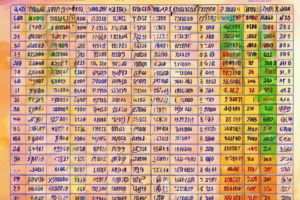Are you considering a career as an RBI Grade B officer? The RBI Grade B exam is one of the most prestigious and sought-after exams in the banking sector in India. Apart from the stature and responsibilities associated with the role, one crucial aspect that applicants often consider is the RBI Grade B salary. Understanding the salary structure of an RBI Grade B officer can provide valuable insights into the financial rewards of the position. In this comprehensive guide, we will delve into the intricacies of the RBI Grade B salary structure, including basic pay, allowances, perks, and promotions.
Overview of RBI Grade B Officer Position
Before diving into the salary specifics, let’s understand the role of an RBI Grade B officer. RBI Grade B officers are responsible for various functions within the Reserve Bank of India, including economic analysis, policy formulation, supervision of financial institutions, and other crucial tasks. They play a pivotal role in maintaining financial stability and regulating the country’s monetary policies. As such, RBI Grade B officers are expected to possess a strong understanding of economics, finance, and banking principles.
RBI Grade B Salary Structure
The salary of an RBI Grade B officer is comprised of various components that contribute to their overall earnings. Let’s break down the different elements of the RBI Grade B salary structure:
1. Basic Pay
- The initial basic pay of an RBI Grade B officer is Rs. 35,150 per month.
- After the implementation of the 7th Pay Commission, the basic pay has been revised periodically.
2. Dearness Allowance (DA)
- DA is provided to RBI Grade B officers to offset the impact of inflation.
- It is calculated based on the All India Consumer Price Index (CPI) and can vary each month.
3. House Rent Allowance (HRA)
- RBI Grade B officers are also eligible for HRA, which depends on the location of posting.
- The HRA can be either 9%, 8%, or 7% of the basic pay, depending on the city of posting.
4. Grade Allowance
- RBI Grade B officers receive a grade allowance as part of their salary, which is based on the grade of the officer.
5. Special Allowance
- In addition to basic pay and allowances, RBI Grade B officers receive a special allowance.
6. Local Allowance
- RBI Grade B officers are entitled to a local allowance, which is again based on the city of posting.
Perks and Benefits
Apart from the salary components mentioned above, RBI Grade B officers are entitled to various perks and benefits, including:
- Accommodation: RBI provides suitable housing accommodation or an eligible leased accommodation facility.
- Conveyance Allowance: Officers are entitled to a fixed conveyance allowance.
- Medical Benefits: Comprehensive medical facilities for self and dependents.
- Leave Fare Concession: Leave travel allowance for traveling with family.
- Gratuity: Lump sum amount paid at retirement.
- Pension: Pension benefits as per rules.
Promotions and Career Growth
RBI Grade B officers have ample opportunities for career growth and promotions within the organization. The career progression is determined through a structured process of examinations, assessments, and interviews. With each promotion, officers can expect an increase in responsibilities and corresponding salary hikes.
Frequently Asked Questions (FAQs)
1. What is the in-hand salary of an RBI Grade B officer?
The in-hand salary of an RBI Grade B officer can range from Rs. 70,000 to Rs. 1,00,000 per month, depending on various factors like location, allowances, and deductions.
2. Is the RBI Grade B exam tough?
The RBI Grade B exam is considered to be moderately difficult, requiring a thorough understanding of economic and financial concepts, current affairs, and analytical skills.
3. How are postings for RBI Grade B officers decided?
Postings for RBI Grade B officers are based on the organizational requirements and may involve transfers to different locations within India.
4. Are there any allowances provided to RBI Grade B officers apart from the basic pay?
Yes, RBI Grade B officers are entitled to various allowances such as dearness allowance, house rent allowance, grade allowance, special allowance, and local allowance.
5. What are the educational qualifications required for the RBI Grade B exam?
Applicants must have a minimum of a bachelor’s degree with specified percentages as per the RBI Grade B eligibility criteria.
6. How often are salary revisions done for RBI Grade B officers?
Salary revisions for RBI Grade B officers are done periodically, usually in alignment with government norms and pay commission recommendations.
7. Do RBI Grade B officers receive any performance-based incentives?
RBI Grade B officers may receive performance-based incentives as part of their overall compensation, subject to organizational policies.
8. Can RBI Grade B officers avail of study leave for pursuing higher education?
RBI Grade B officers may be eligible for study leave to pursue higher education or specialized courses, subject to certain conditions and approval processes.
9. What are the work hours for RBI Grade B officers?
The work hours for RBI Grade B officers are typically defined in line with government norms and organizational policies, with provisions for overtime or additional work as required.
10. Are RBI Grade B officers covered under any insurance schemes?
RBI Grade B officers are usually covered under group insurance schemes and other welfare measures provided by the organization for their well-being and financial security.
In conclusion, the RBI Grade B salary offers a competitive package with attractive perks and benefits, making it a coveted position among banking aspirants. The opportunities for career growth and professional development further enhance the appeal of this role. If you aspire to pursue a career as an RBI Grade B officer, understanding the salary structure and associated benefits can provide valuable insights into the financial rewards and opportunities that await you in this esteemed organization.



